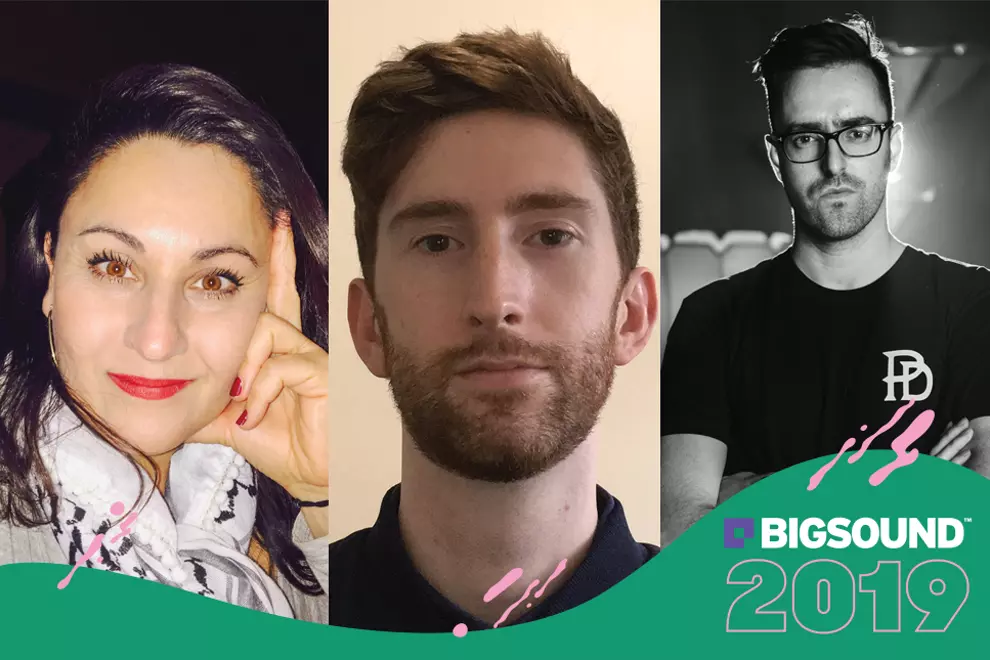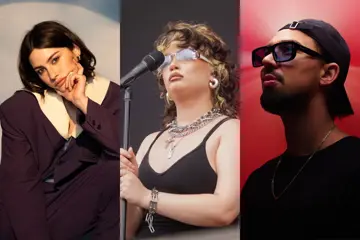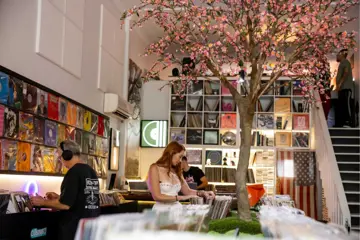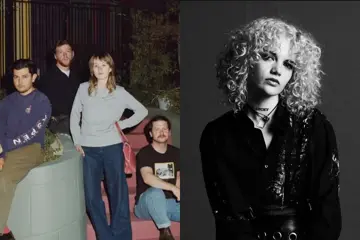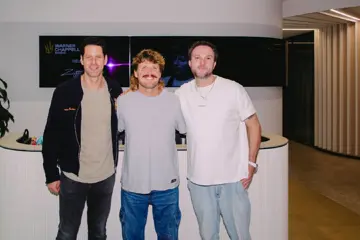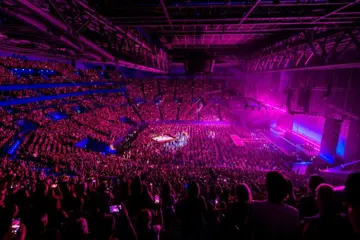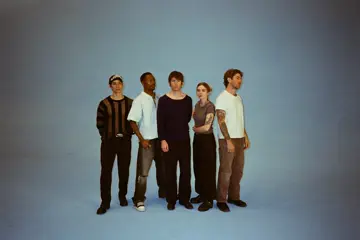Discussing her latest single, Sampa The Great stated, "Freedom is about one of the most important talks you will ever have as an artist in this industry: the balance of earning a living and expressing your artistry, and what you’re willing to compromise through it all.”
"There are lots of working artists out there that can't afford to eat," BIGSOUND conference speaker Koo Abuali, a successful professional artist who founded FireWire Music Company in 2015, sympathises. "Times have changed and the way that music is created obviously has changed, but the way that music is marketed and consumed has also changed. There are a lot more avenues for artists to make money, but they need to be aware of them and they need to be able to understand what they're doing... If you wanna make money from your music there are lots of ways to do it that are not glamorous - even if you make $50 a license for a tiny little one-minute video that's gonna be shown in Bulgaria at a conference."
Three BIGSOUND 2019 events - the What Is Music Supervision? and Supervisionary Supervision panels and the Publishing And Sync hook-up, which gives attendees the opportunity to chat directly with speakers - enlist the expertise of music supervisors to explain exactly how sync licensing deals work while referencing examples from their comprehensive experience working in this particular field.
Brisbane-raised Kurt Steinke, a music producer/supervisor at Townhouse in New York, is returning to his old stomping ground for BIGSOUND conference speaker duties and also acknowledges that "it's pretty hard to be a full-time musician". "For a lot of bands one sync placement could cover the costs for their whole next album or keep them going for six, 12 months, essentially," he says. "I think people are looking at it more as a sort of means to sustain their career and help them achieve longevity in what they wanna do creatively.
Don't miss a beat with our FREE daily newsletter
"Obviously she's very well known in Australia, but I did a sync for Sampa The Great. I synced one of her tracks for a Walgreens commercial, which is like a very mainstream pharmacy; they did a spot about women battling cancer. I used her track Female and that was an example of the brand feeling really excited about an artist that they had never heard of, and it was so strong and it's speaking for itself. And I think being on a commercial like Walgreens - it's not, like, launching Sampa's career, 'cause she's already doing great, but it's exposing her to maybe a different demographic that would've never heard her music. It's opening other people's ears to music they may not have heard."
Australian electronic duo Peking Duk have successfully secured multiple sync placements and their manager Ben Dennis, Myriad Management's Owner/Director, is scheduled to speak on BIGSOUND's Rethinking The Relationship Between Band And Brand panel. Dennis says the "vast majority" of Peking Duk's syncs were "procured by [their] teams at BMG and Sony Music". "Some syncs will come to fruition from other opportunities and relationships such as brand partnerships or event partnerships," he adds. "One of these examples was when Peking Duk performed at the Australian Open. We were fortunate enough for the Australian Open to sign a deal to use the band's song Feels Like as the TVC [television commercial] for the 2017 Australian Open, an advertisement that ran for four months on a variety of platforms including free-to-air, pay TV, social media and radio."
Dennis confirms Peking Duk noticed "new fan engagement from overseas territories" after another of their songs was synced for a video game trailer: "There was a spike in streams off the back of a sync with winter sports video game Steep. Say My Name was the key track for the trailer for the game and a part of the soundtrack."
When asked to describe the job of music supervisor in layman's terms, Abuali offers, "It's about doing the work that's needed to make sure the music and the music landscape is right for the project."
Abuali spent 15 years working in the US as a music supervisor and also does consulting work. Having already worked on hundreds of film, advertising and TV projects, she singles out the Julia Roberts-produced feature film Jesus Henry Christ, starring Toni Collette, as one of her career highlights to date. Jesus Henry Christ uses Home by Edward Sharpe & The Magnetic Zeros in the closing credits and Abuali reveals, "We got that song for relatively cheap because of the fact that it wasn't well known at the time and I happened to know the manager."
Even though publicists, labels and third party sync representatives email tracks directly to Townhouse, Stein discloses, "It's not a requirement to have a team around you to land a sync placement; I've done deals where I've just reached out to artists directly."
So what can artists do to get the attention of music supervisors? "If you're just making waves in what you're doing musically, you'll probably get onto a good music supervisor's radar," Steinke, who admits he still listens to triple j's Home And Hosed, opines. "I'd focus on the more immediate things rather than trying to kick the goal of landing an ad right off the bat... Start with the things that are more immediately attainable goals, get a bit more buzz around that and then the story when you reach out to a supervisor is like, 'Hey! I'm so-and-so artist, check me out. I just got posted on this blog. Here's my new single, take a listen!' - I feel having something like that rather than just emailing someone blind is probably a better way to go; it shows that you're getting a buzz in your own right and often people are looking to sort of tap into someone who's already buzzing... I'm still really passionate about finding new music - that's what excites me the most. So if you're pushing your music out there, I think, whether or not you realise it, there are people listening and opportunities can pop up from strange places."
"Honestly, pretend like we don't even exist... A good music supervisor will find you," is Abuali's advice for artists hoping to be on her radar. "Definitely go to conferences like BIGSOUND and things like that, and then just introduce yourself to the music supervisors, but don't say you wanna send them music.
"I know that that's a really active way of doing it, but, I'm telling you, it's really unlikely that I will be able to listen to all the music that's sent to me. Whereas if they develop a personal relationship with me in some way or they know something about me, like they say, 'Hey I really love the way you put that Edward Sharpe & The Magnetic Zeros song at the end of the movie,' then I'll be like, 'Oh, yeah, this person knows what they're talking about.' And then I will ask them, 'Hey, what do you do? What's your music about?' And then I'll tell them to send it to me and I'll pay attention to them."
Having also experienced "some really great sync successes" with another act on his boutique management company's roster, Hands Like Houses ("WWE approached us to use their track Monster as the theme for the WWE’s showdown at the MCG in Melbourne"), Dennis points out, "Getting a sync deal, no matter the size, is always a huge milestone. The ancillary income from a good sync, for an up-and-coming artist, can be the difference between working part-time and focusing on their songwriting full-time. Sync deals we have found go beyond just the fee attached, they are super-important for exposure in worldwide markets and newer demographics that may not have discovered the artists yet."
WWESuper amped to have "Monster" as an official theme song of WWE's Super Show-Down! 🤙smarturl.it/MonsterVideo
Posted by Hands Like Houses on Thursday, September 27, 2018
When asked whether the fear of 'selling out' still prevents some artists from aligning with brands, Steinke considers, "There's still some artists that I've interacted with, and deals we've tried to do through my agency, where artists have moral reasons why they might not be fond of working with particular brands sometimes and that completely makes sense. But the point of view of it being seen as selling out, for the most part, doesn't really exist so much any more; I think it's seen as a pretty fair and reasonable thing to do."
"Considering we live in a society where the vast majority of musicians live below the poverty line, or close to it, I’m not sure if there is any justifiable point in saying that a well-curated brand partnership is selling out," Dennis seconds. "As long as both sides of the partnership respect the integrity, then a partnership can be a great move from not just a monetary perspective but an exposure perspective also."

